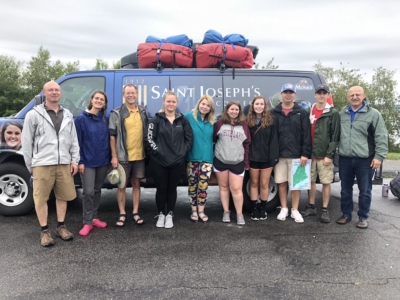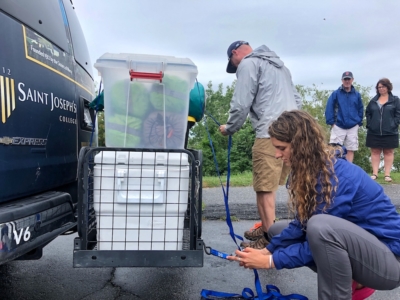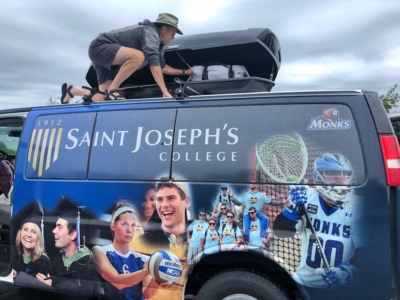Two countries. Three states. Six Maine islands. One thousand miles. Environmental Science Semester students start journey to gather and interpret data from unique field sites.
by Patricia Erikson

Environmental Science Semester 2018 faculty and students on launch day. Photo: Patricia Erikson.
Saint Joseph's College family members gathered at East End Beach in Portland to send off their students on the Environmental Science Semester (ESS), a ten-week field science program. Field Assistant Elyse Caiazzo '18, Dr. Greg Teegarden, and Dr. Johan Erikson loaded all of the gear and students' dry bags onto the roof and rear of the Saint Joseph's College van (a task that appeared impossible at first).
Before families said their goodbyes and departed, Vice President and Chief Learning Officer Michael Pardales assembled the group into a circle. He offered a blessing for their safe journey and gave thanks for Creation and their work as scientists to steward our Common Home.
Rooted in both experiential and immersion education, the entire Environmental Science Semester program occurs off campus from day of launch through the last final exam and project. ESS students are enrolled in a full-time load consisting of four courses–Climate Change and Glacial Geology, Marine Ecology, Oceanography, and Field Methods.

Field Assistant Elyse Caiazzo '18 loads the Environmental Science Semester van with Dr. Greg Teegarden. Photo: Patricia Erikson.
Founded in 2014, the ESS experience creates a transformative educational experience by having students study and conduct Environmental Science in the field for two continuous months.
Over the course of the program, students travel over a thousand miles across two countries, three states, and six Maine islands as they gather and interpret data from unique field sites. Beginning in mid-August, the ESS travels to New Hampshire's White Mountains to view the effects of alpine glaciation, then to eastern Maine, Nova Scotia, and New Brunswick investigating evidence of both ice age and tropical climates. Students travel to Cape Cod and to the southern coast of Maine for studies of ecosystem interactions in the marine environment. Finally, in October, students plumb the depths of the Gulf of Maine (i.e., study oceanography) from a historic Maine schooner.

Supplies for the Environmental Science Semester are loaded on the roof and rear rack of the van. Photo: Patricia Erikson.
Learn more about the Environmental Science Semester program here or read about their Oceanography experience on the historic schooner in a Portland Magazine article.


